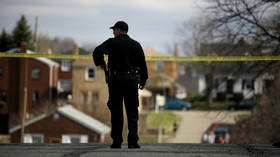Progressive prosecutors: How pupils of US leftwing activists come to power as attorneys

According to San Francisco police, Troy Ramon McAlister, a habitual criminal, sped down a city street on New Year’s Eve in a stolen car, ran a red light, struck another vehicle, and plowed into two pedestrians – killing them both.
McAlister, 45, who was intoxicated, got out of the car and fled into a nearby building, where officers found him within minutes and arrested him. Inside the vehicle, they allegedly found a handgun with an extended magazine and suspected drugs.
It was, said city Police Chief Bill Scott, a “senseless tragedy that shouldn’t have happened;” the accused man was well known to his officers. He had been let out of prison on parole for robbery in April 2020, and had since been arrested numerous times for violations of that parole, including car theft and possession of drugs.
Despite all these arrests, however, prosecutors supervised by San Francisco’s progressive District Attorney Chesa Boudin chose not to file charges on any of those occasions, allowing McAlister to stay on the streets until the New Year’s Eve fatalities.
Meanwhile, San Francisco is enduring an ongoing, unchecked plague of bold home invasion robberies, while residents face one of the highest car break-in rates of any American city.
Some 400 miles to the south, the railway yards of Los Angeles are strewn with trash and debris as the city’s surging homeless population takes to raiding trains full of retail items and mail order packages with impunity.
Across town, police arrested Shawn Laval Smith this month for the murder of 24-year-old Brianna Kupfer, a UCLA student working at a small furniture store. Records show the bail jumper and homeless drifter was charged with multiple crimes across the County of Los Angeles over the last two years, but another progressive district attorney, George Gascon, delayed filing charges against Smith before the seemingly random murder.
On the other side of the country, incoming New York District Attorney Alvin Bragg has announced that his department now intends to prosecute only the most egregious crimes, even while restaurants and other businesses across the five boroughs begin hiring their own private security forces to battle skyrocketing Big Apple crime rates.
While across in Philadelphia, DA Larry Krasner has presided over an all-time record for homicides in the city, with 561 murders in 2021 – while carjackings tripled over the last year.
The unifying feature in all of these true crime reports is the presence of a progressive, reform-minded Democrat prosecutor in the DA’s office. Many swept into power during the outrage over the murder of George Floyd in May 2020, assuming a mandate to attack a criminal justice system they believe is systemically racist.
A vital law enforcement debate now rages in the face of rising crime, between conservatives who believe the sole responsibility of a prosecutor is to charge and convict criminals, and progressives who see an opportunity to recalibrate a system they see as overly punitive toward minority suspects.
Many, like San Francisco Police Chief Bill Scott, point an accusatory finger at DAs and accuse them of being too lenient towards recidivist offenders, and that this is fuelling skyrocketing crime figures. After the killing of the two pedestrians on New Year’s Eve, Scott chose his words carefully, saying that his police department took responsibility “whenever we fall short of expectations… That’s an approach every element of our criminal justice system needs to embrace. We must all be held equally accountable for the decisions we make, because they can have serious implications for the safety of those we serve.”
Even Troy McAlister’s family are critical of the DA for letting him back out on the streets after his 2015 armed robbery. “I don't know why they released him. I really cannot understand that,” said his uncle, Theo Smith.
But Rebecca Goldstein, a law professor with the Jurisprudence and Social Policy Program at the University of California, Berkeley, disputes the idea that these big city prosecutors view reform as a greater responsibility than charging and convicting criminals.
“These reform prosecutors would certainly dispute the notion that they view their jobs as reformers first and criminal prosecutors second,” Goldstein says. “I think they'd argue that effective criminal prosecution doesn't just count up convictions. The idea is to provide justice for both victims and offenders by using the prosecutor's discretion to arrive at fair outcomes, rather than seeking the harshest possible penalties at all times.”
Michael O’Hear, a law professor at Marquette University, agrees with Goldstein that it’s an oversimplification to see a district attorney’s job as either prosecutor or reformer.
“I’m not sure everyone would agree that ‘reform’ and ‘prosecution’ are separate jobs,” O’Hear says. “Prosecutorial reforms are usually framed as efforts to make prosecution more efficient and effective in reducing crime. The disputes relate more to means than ends.”
O’Hear believes progressive DAs emphasize rehabilitative treatment, alternatives to conventional charging and sentencing, and building trust with marginalized communities. Meanwhile, traditionalists emphasize deterrent threats and incapacitation of repeat offenders through convictions and incarceration.
“My sense is that many (but not all) police officers and line prosecutors have more confidence in the traditional than the progressive approach,” O’Hear adds. “Defense lawyers tend to favor the progressive approach. I suspect that judges may on the whole be more traditionalist, although the same political forces that have aided progressive prosecutors in some cities may be affecting the judiciary, too.”
As with most aspects of mass society, race and politics play a major role in this dispute between progressive and traditional philosophies. Since the Floyd incident, race has emerged as the driving force behind urban DAs refusing to pursue less serious offenses and avoiding secondary charges (such as gun possession).
San Francisco’s Boudin and LA’s Gascon are leading the charge in employing prosecutorial reform as a weapon against perceived systemic racism. In public statements, both men consider racial imbalances in state prison populations to be a result of inequitable prosecution.
To the progressive’s perception, reformers like Boudin and Gascon are fighting to stop the trend of racial minorities constituting a majority percentage of prison populations. To the more conservative or traditional mindset, these reformers are essentially saying to criminals, “Life dealt you an unfair hand. Now you get to commit some crimes without punishment.”
Among the California pair, Boudin had the strangest path to the DA’s office. His parents, Kathy Boudin and David Gilbert, were convicted of murder for their role in the infamous 1981 Weather Underground Brink's robbery. Boudin’s mother was sentenced to 20 years to life, and his father received a sentence of 75 years to life for the felony murders of two police officers and a security guard. Both are now released.
Since he was still a baby when his parents were sentenced, Boudin was raised by activists Bill Ayers and Bernardine Dohrn, also members of the leftist Weather Underground. Originally grown from the 1960s college-driven Students for a Democratic Society, the group was a protest group structured with a mix of Marxism, Black Power and political anarchy. During the 1970s, the group shifted from activism to violent terrorism by bombing multiple banks and government buildings.
Though the group began to fade from the cultural scene following the end of the Vietnam War, many members continued to commit violent crimes. The Boudin-led Brink’s robbery was one of the group’s final crimes before its eventual dissolution. In the attack, one of their victims was Waverley Brown, the first black American officer on his small-town New York police force.
The ascension of the younger Boudin to high public office shocked many – even in the extremely progressive city of San Francisco – when the public defender, who had never charged a criminal in his career, became the lead prosecutor in California’s second-largest city.
After a massive spike in Bay Area crime that shocked even San Francisco’s progressive mayor, Boudin now faces a recall election. On June 7, San Franciscans will decide if it was a mistake to vote a life-long criminal defender into office as DA. Meanwhile, to the south in LA, petitions are now circulating to force Gascon into a similar recall.
Regardless of those efforts to oust Boudin and Gascon from office, Goldstein insists there hasn't been widespread electoral buyer's remorse with reform-minded DAs.
“No one elected to a chief prosecutor position on a reform platform has yet lost reelection,” Goldstein explains. “(Philadelphia DA) Larry Krasner faced a huge increase in homicides in 2020 compared to 2019, and he still won his primary with a landslide 65% to 35% margin against a longtime homicide prosecutor whom he'd fired in the first few weeks of his term.”
Goldstein also pointed to DAs Kim Foxx (Chicago) and Kim Gardner (St. Louis), who both won reelection despite crime increases. “There has certainly been vocal opposition to these officials, largely from the same quarters that criticized them during their initial campaigns,” she says. “But I don't think it's fair to characterize this as widespread buyer's remorse at all.”
Rachel Barkow, faculty director at the Center on the Administration of Criminal Law at New York University, agrees with Goldstein that elections remain the determining factor in greenlighting reforms.
“I think you’re seeing people who never supported these DAs in the first place (such as police unions) continuing to campaign against them even after they won their elections,” Barkow says. “They’re trying to relitigate the outcome of the election in the press. The media is receptive to spinning that narrative, so it may look like there is more opposition than there is. But the real measure is what happens when these DAs come up for reelection.”
Barkow insists reform is possible everywhere if there’s political will to do it, and she sees these DAs under fire as looking for a new way to keep communities safe.
“I think every DA, including Gascon and Boudin, prioritizes public safety,” she adds. “When they pursue reforms, it is because they believe, based on data and evidence, that those reforms will yield better safety outcomes than the status quo approach.”
All of the cities mentioned (San Francisco, Los Angeles, Philadelphia, Chicago, etc.) are largely long-standing Blue State progressive enclaves where conservative candidates of any ilk find it difficult to gain traction. In such cases, publicly supported recalls become the only path to removing such prosecutors from office.
Turning aside the never-ending war of progressive against conservative, O’Hear believes the struggles for criminal reform are often due to the bureaucratic nature of the district attorney’s world.
“There is a lot of inertia in such organizations that can make them resistant to change,” he says. “Since there is never a shortage of crime in these cities, opponents of reform will always be able to point to one horrific crime or another that can be blamed on a ‘soft’ DA. On the other hand, for proponents of reform, it is precisely the large volume of urban crime that necessitates new approaches.”
O’Hear breaks the ongoing struggle between incarceration and reformation down simply: “The argument is that there aren’t enough criminal justice resources available to catch, convict and incarcerate every criminal, so resources need to be used more efficiently. For example, it costs less to give treatment to an offender in the community than to incarcerate that offender, and, depending on the quality of the program, treatment may also do a better job than incarceration of reducing the offender’s risk of reoffense. That means more crime-reduction bang for the criminal-justice buck.”
America’s attention to the pitfalls of such criminal reform efforts sharpened during the Christmas parade in Waukesha in December. Less than 45 minutes into the annual celebration, a red Ford SUV traveling at freeway speeds drove down the full length of the parade route. The attacker never slowed down and steered into women and children before disappearing from the scene. Six died, including one child, while dozens were wounded. The final victim left the area’s children's hospital on January 15.
Within an hour of the attack, Waukesha police located the SUV and arrested Darrel Brooks Jr, 39. The owner of a lifelong criminal history with charges spread across three states, Brooks now faces 71 charges, including six counts of murder.
A public records search revealed Brooks’ history with violent crime and sex charges running as recently as early November. He allegedly confronted a woman outside a hotel, punched and ran her over with the same SUV used in the parade attack.
After facing charges for that vehicular assault, Brooks paid a cash bond of $1,000 and left a Milwaukee County courtroom. After his six victims died, Milwaukee’s own reform prosecutor, District Attorney John Chisholm, called the $1,000 bail “inappropriate” while facing calls for his own removal by Wisconsin conservative officials.
In the end, O’Hear considers the debate over prosecution and reform as a case of political philosophies at odds.“I think reasonable minds might differ on how the DA’s ‘primary responsibility’ should be defined and whether ‘prosecuting crime’ should be equated with obtaining convictions and filling jail and prison cells,” he says. “If the DA’s primary responsibility is understood to be making the best use of scarce criminal justice resources for crime-prevention purposes, the current crime surge should indeed be a major concern for progressive prosecutors, if only from a political standpoint.”















